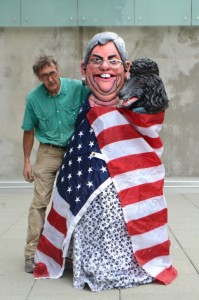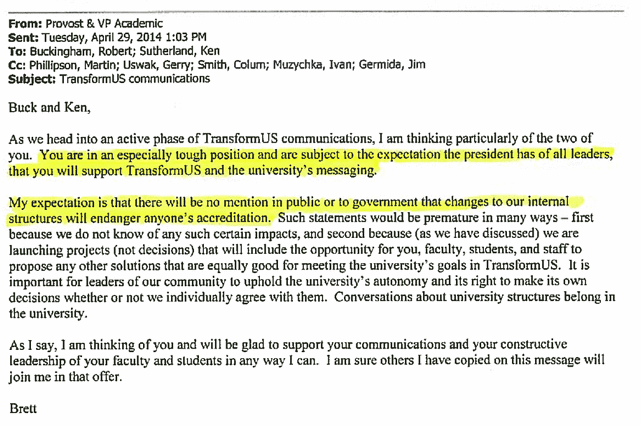I’ll admit to a quaint hope that universities are still places where dialogue and dissent are both possible and desirable, but two incidents in the last week leave me scratching my head. The first is the theft of professor George Rammell’s sculpture by the Capilano University administration, and the second is the firing of Robert Buckingham, Dean of the School of Public Health at the University of Saskatchewan. The issues in the two cases are not the same, but what both share is an unbelievable authoritarianism on the part of the upper administration, a willingness to trample on academic freedom and the absolute intolerance of resistance or disagreement about program cuts and restructuring. The point is not whether each of these universities plans for budget cutting and trimming are appropriate (that would be a different post), but the response to faculty and middle management who DARE to disagree with the upper administration. If this doesn’t have a chilling effect on everyone in Canadian higher education, well we are all being just too polite.
 THE CASE OF THE MISSING SCULPTURE
THE CASE OF THE MISSING SCULPTURE
At Capilano University there have been severe program cuts. One program area in which cuts are deep is the arts. George Rammell, sculpture instructor, used his scholarly form of expression to comment on those cuts ~ he created Blathering on in Krisendom, a work in progress depicting Capilano University president Kris Bulcroft wrapped in a U.S. flag with a poodle. The sculpture went missing last week:
“I immediately called security and the guard told me that orders were given by the top level of the Administration to seize it. I could hardly believe my ears. The Administration had ordered my piece removed off campus to an undisclosed location, without any consultation or prior discussion. I was shocked and not sure if this was Canada,” Rammell stated (as reported in the Georgia Straight).
Jane Shackell, chair of the Board of Governors, released a statement saying that Capilano was “committed to the open and vigorous discourse that is essential in an academic community.” But she had the sculpture removed because it was “workplace harassment of an individual employee, intended to belittle and humiliate the president.” A post for another time, but this might well be the most egregious, inappropriate use of respectful workplace rhetoric to create a workplace where dialogue, dissent, and discourse are not allowed.
Of course, Rammell’s work is easy for the University to steal, but the parallel for some of us might be an administration that comes to your office and wipes all of the files for that critical analysis of higher education book you are working on from your computer. After being AWOL for a week, Capilano University has agreed to return Rammell’s work, but has banned the sculpture from campus and Rammell calls that censorship. It is and it isn’t harassment either. So much for academic freedom.
THE SILENCE OF THE DEANS
 Then comes the news, Robert Buckingham, Dean of the School of Public Health at the University of Saskatchewan was fired, relieved of his professorial appointment and tenure, and escorted of the campus ~ for disagreeing publicly with the administration’s restructuring and budget cutting plan, TransformUS.
Then comes the news, Robert Buckingham, Dean of the School of Public Health at the University of Saskatchewan was fired, relieved of his professorial appointment and tenure, and escorted of the campus ~ for disagreeing publicly with the administration’s restructuring and budget cutting plan, TransformUS.
In discussions of TransformUS, middle managers were ordered to get in line and on board with the plan, and threatened if they spoke publicly against it. Here’s the email from the provost:
 That a University would want deans who are lackeys and submissive to the upper administration’s “messaging” says a great deal about that administration. Unlike the CapU incident, this is less about academic freedom and all about the importance of maintaining an openness to dialogue and disagreement within the University. Such a heavy handed administrative approach assaults our sensibilities about how even the modern, corporatized U operates. On top of all that, the termination of Buckingham comes a mere five weeks from his retirement and is amazingly mean-spirited.
That a University would want deans who are lackeys and submissive to the upper administration’s “messaging” says a great deal about that administration. Unlike the CapU incident, this is less about academic freedom and all about the importance of maintaining an openness to dialogue and disagreement within the University. Such a heavy handed administrative approach assaults our sensibilities about how even the modern, corporatized U operates. On top of all that, the termination of Buckingham comes a mere five weeks from his retirement and is amazingly mean-spirited.
CAUT director, Jim Turk said:
What the president of the University of Saskatchewan has done is an embarrassment to the traditions and history of the University of Saskatchewan and it’s an embarrassment to post-secondary education across Canada. It’s inexcusable.
He’s right about that!

 Follow
Follow
 THE CASE OF THE MISSING SCULPTURE
THE CASE OF THE MISSING SCULPTURE

Equity, Governance, Economics and Critical University Studies #criticaled #edstudies #ubc #ubced #bced #yteubc
Workplace: A Journal for Academic Labor
Equity, Governance, Economics and Critical University Studies
No 23 (2014)
As we state in our Commentary, “This Issue marks a couple of milestones and crossroads for Workplace. We are celebrating fifteen years of dynamic, insightful, if not inciting, critical university studies (CUS). Perhaps more than anything, and perhaps closer to the ground than any CUS publication of this era, Workplace documents changes, crossroads, and the hard won struggles to maintain academic dignity, freedom, justice, and integrity in this volatile occupation we call higher education.” Workplace and Critical Education are published by the Institute for Critical Education Studies (ICES).
Commentary
Articles
Leave a comment
Posted in AAUP, Academic freedom, Adjuncts, Administration, BC Education, Commentary, Critical Education, Critical University Studies, Environment, Equity, Ethics, Governance, Government, Organizing, Research, Student Movement, Student Speech, Students, Working condition
Tagged Academic freedom, BC education, Budgets & Funding, Critical Education, Equity, Ethics, Government, Publishing, Students, Working conditions, Workplace Journal